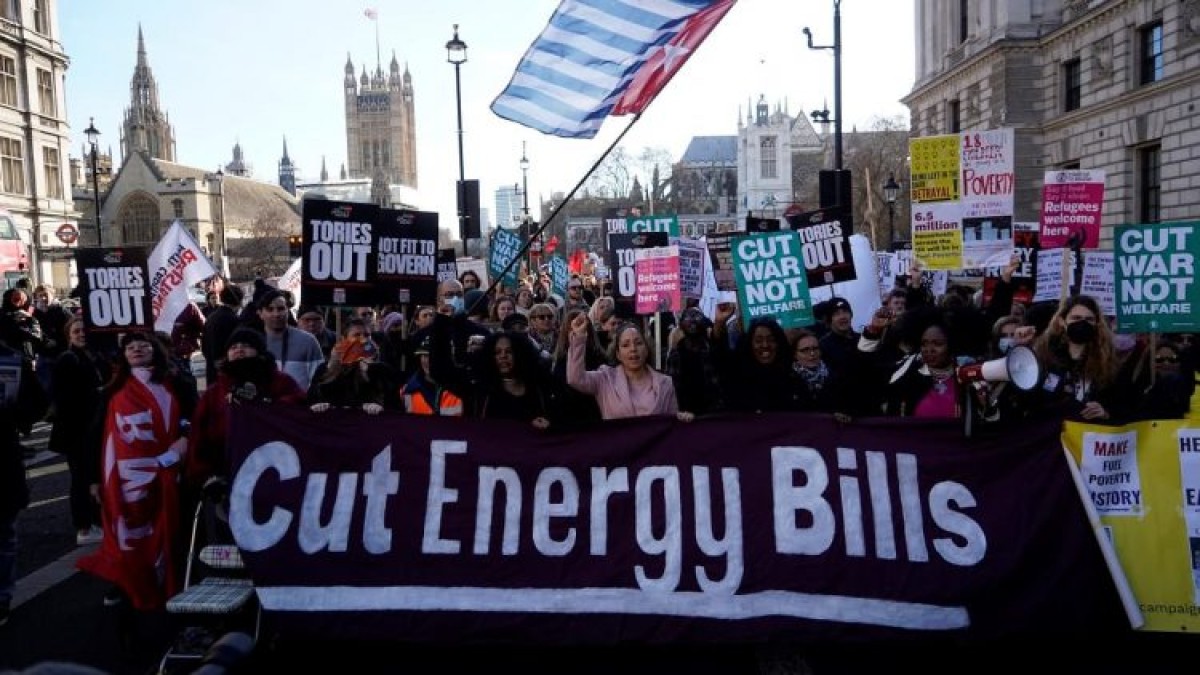 85
85
Due to soaring food prices and the international energy crisis, the UK is embroiled in an all-time high of 9.4% in June, sounding alarm bells for British economists.
Accordingly, the Bank of England (BoE), the central bank of the United Kingdom, estimated that unbridled inflation would exceed 12 per cent by the end of the year.
Observers estimate that the global increase in the cost of energy and food is the most significant factor in the exponential surge of inflation in the UK, as energy costs have skyrocketed by 40% over the last year, while food prices have grown by 10%.
Over the preceding three months, economic activity in the UK has seen a steep slump, and real wages in the UK have decreased at the fastest pace since 2011, while consumer confidence is at its lowest level.
Currently, wages are the same as before the 2008 global financial crisis. Numerous experts argue that family incomes have not increased in recent years, creating an utter social catastrophe.
Research conducted by the ‘Resolution Foundation’ on the quality and standard of living of British citizens demonstrates that low growth productivity and social inequality are the leading causes of the current financial calamity.
The report added that the economic status of British families is almost £9,000 inferior to that of families living in similar countries, including France, Germany and Australia. Moreover, the UK’s productivity gap with France and Germany has approximately tripled since 2008.
In addition, the study findings indicate that the lowest-income households in England are more financially vulnerable and earn forty per cent less than their counterparts in France and Germany. The survey shows eight million young employees have not received a salary raise.
On the other hand, the business growth rate in Britain is next to zero as consumer demand reaches rock bottom, which ultimately aggravates the rising living standards.
Additionally, the value of firms that provide consumer services and retail goods has also plummeted sharply.
The International Monetary Fund (IMF) has also projected that the British economy would have the poorest growth compared to other major economies during the next year, owing to the country’s disastrous financial downturn over the last four decades.
These precarious circumstances prompted the British central bank to put up the interest rate by 0.25 per cent five times.
Mark Thompson wrote in a CNN piece that over the following winter, the average annual energy cost for British households would climb by 50% to £3,000, or roughly $3,600.
Thompson added that without nationwide economic progress, the constant drop in revenues could not be reversed, and it is unlikely that any Prime Minister could turn around the sinking British Titanic.
Although growth rates are incessantly falling among the G7 members, the UK economy is particularly poised to plunge into a looming abyss of ‘Stagflation’ or recession-inflation.
In February 2022, England was the fifth largest economy in the world, but this coveted position was ruined in March 2022, when the GDP dramatically dropped. This decline persisted in April and is expected to continue at a 0.3% annual rate.
Nearly all activity has ceased in the three main economic sectors—services, factory production, and construction. May was the second consecutive month of declining retail sales, and the bad news will surely continue.
Negative economic development is dreadful news for the next UK Prime Minister, whose future is already doomed, given that government debts have risen to 90% of GDP, exacerbating the present politico-economic predicament.
In the meantime, the Office for Budget Responsibility (OBR) has predicted that if the adverse aspects of population ageing are combined to other detrimental economic parameters, the UK’s public debt will jump to 250% of GDP in the long run, implying that future administrations will never be able to lower taxes.
This troubling situation has caused the British citizens to be disappointed in their future and seethe with anger and indignation. “Don’t pay UK”, an anonymous group encouraging people to pour into the streets and not pay their bills, says it hopes enough citizens join the campaign to put British energy companies in “serious trouble”. It remains to be seen when the volcano of popular wrath will explode to cause more problems for Her Immortal Highness in Buckingham Palace.
Comment
Post a comment for this article